Jonathan Cook examines how intellectual and cultural life gets captured by the billionaire class.

(Financial Times, Flickr, CC BY 2.0)
By Jonathan Cook
Jonathan-Cook.net
 In these posts I try to highlight how our social, cultural and political structures are rigged to reflect the interests of an economic elite and maintain their power. Because the forces that shape those structures are largely invisible — we mainly notice the people and buildings inside these structures — the way power operates can be difficult to describe and to understand.
In these posts I try to highlight how our social, cultural and political structures are rigged to reflect the interests of an economic elite and maintain their power. Because the forces that shape those structures are largely invisible — we mainly notice the people and buildings inside these structures — the way power operates can be difficult to describe and to understand.
To use a familiar analogy, we are like a fish that cannot see the water in which it is submerged. Water completely orders its life: how it swims, that it swims, the limits of where it can swim, and so on.
Power orders our lives similarly. The difference is that the way power is organized in our societies is not natural — “the normal order of things” —in the way water is for a fish. A wealth elite engineers our environment to perpetuate itself and sustain the power structures on which it depends.
It is because we are largely blind to this engineered environment that we don’t get out of bed each morning determined to overthrow our governments for maintaining financial systems that tax nurses and teachers at a higher rate than they do transnational corporations; or that protect private, usually inherited, wealth parked offshore; or that reward corporations for “externalizing” their costs — that is, offloading them in ways that destroy the environment and the future of our children.
Resignation — our assumption that this is just the way things are — is made possible only because every day we face endless propaganda: in our schools, in our places of higher education, in the workplace, and most especially from the so-called mainstream — code for billionaire-owned or state-run — media.
Our minds are battered each day into submission, so much so that fairly quickly our childhood exuberance, curiosity and wonder, and our sense of fairness and justice, is crushed into a soulless technocrat’s ideas of order, efficiency and pragmatism. We are sidetracked into, at best, debates about how we can improve the status quo, rather than whether the status quo works or, even more usefully, whether the status quo is dangerous and eco-cidal.
Ideological Capture
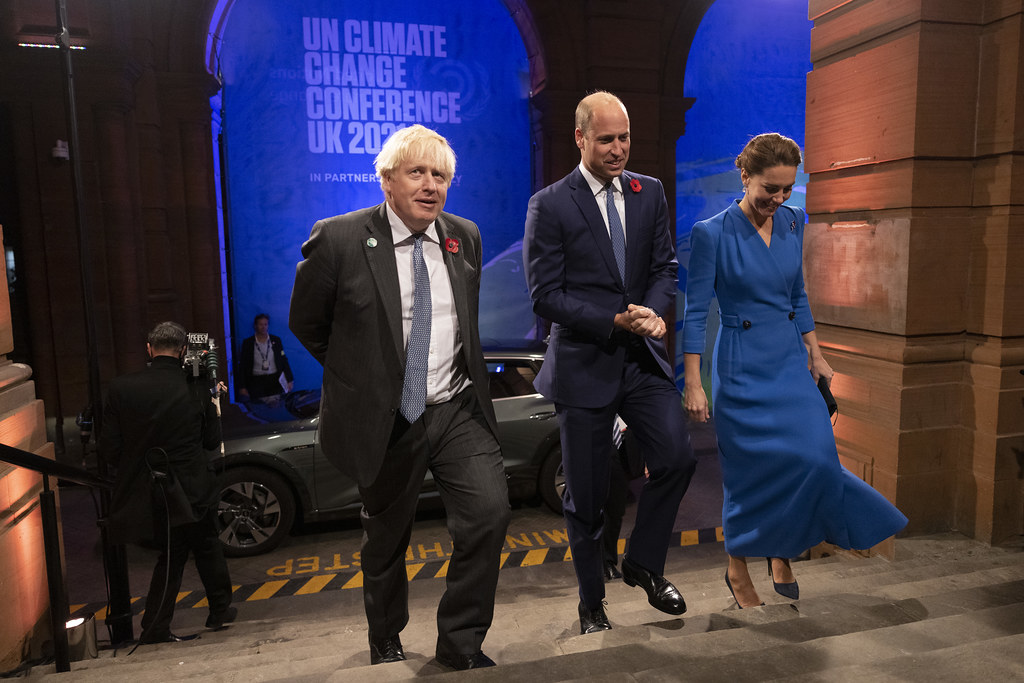
Johnson with Prince William and Catherine, Duchess of Cambridge at Kelvingrove Museum as part of the COP26 climate gathering in Glasgow, Nov. 1. (Simon Dawson, No 10 Downing Street)
The propaganda system tightly constrains our understanding of political and ideological realities to make them dependent on the economic priorities of the ultra-rich. We become unconscious lobbyists for the lawless and immoral activities of corporations and billionaires.
This ideological capture was neatly illustrated by one liberal analyst who bewailed the danger posed by those who seek to challenge the status quo:
“If you want to replace the current system of capitalism with something else, who is going to make your jeans, iPhones and run Twitter?”
The layers of ideological protection around this system — the degree to which our intellectual and cultural life is entirely captured by the billionaire class — was highlighted, inadvertently as ever, in an exclusive report this week in The Guardian.
Under the headline “Watchdog stopped ministers breaching neutrality code in top BBC and BFI hires,” we get an insight into how our “watchdogs” operate — not primarily to protect our interests from high-level corruption, but to preserve the existing system of power by preventing it from being discredited.
The Guardian report is based on the response from the Office of the Commissioner for Public Appointments to a Freedom of Information request. That response reveals that Peter Riddell, who served until last month as the commissioner overseeing public appointments, blocked efforts by the government of Boris Johnson to rig the system to make it even easier for Tory party donors and cronies to head the U.K.’s most important public bodies.
Image of Democracy
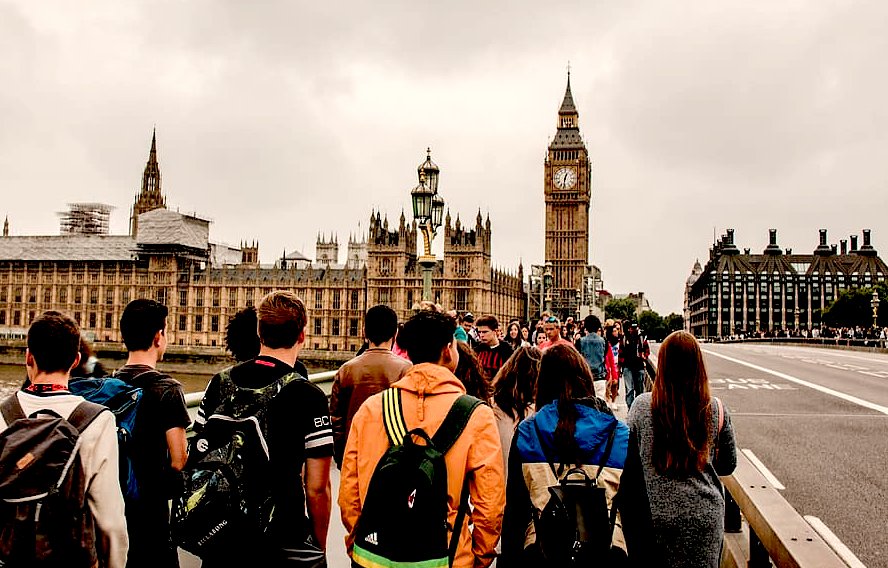
Approaching Big Ben and the House of Parliament, London. (PxFuel)
Riddell was appointed to the commissioner’s position in 2012 by the Conservative government of David Cameron.
Riddell is a former journalist, and one, it should be noted, who is about as establishment as they come. He worked his way up through the economic elite’s house journal, The Financial Times, for 20 years. Then he joined The Times, the political elite’s house journal, where he spent a further two decades, first as a political commentator and then as assistant editor.
Riddell was an early member of the secretive Gibson inquiry that was supposed to investigate British complicity in the U.S.-led torture and rendition program. The inquiry, with its tightly delimited remit, didn’t even manage to reach the level of a whitewash. It failed to get to grips with the most pressing issues around systemic law-breaking by the U.K. and U.S., and what modest findings it did reach were quietly shelved by Cameron’s government.
Riddell has also held senior roles at the Hansard Society and the Institute for Government, both elite institutions concerned with strengthening the substance and image of parliamentary democracy in the U.K. to avert growing criticism of its glaring deficiencies.
So Riddell — who was honored by the queen in 2012 as a commander of the British Empire (CBE) for his services to journalism — is very much integrated into the establishment that runs the country for its own benefit. But he is also on the wing of it that is most anxious about the masses getting restless if the failures inherent in a system designed to uphold the establishment’s power become too apparent.
Carefully Selected
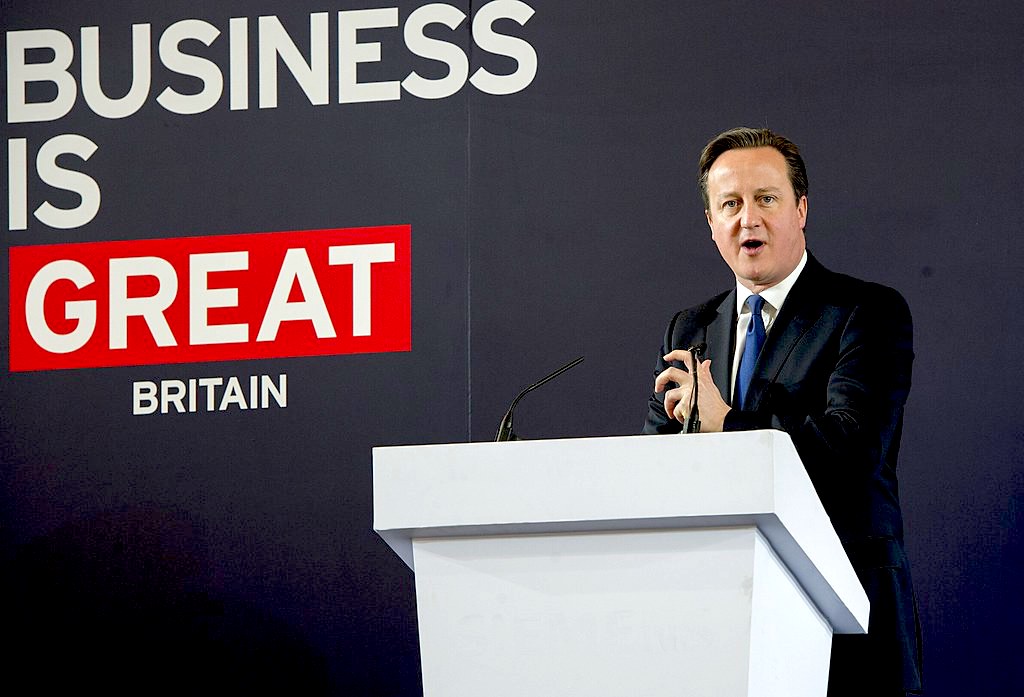
December 2013: U.K. Prime Minister David Cameron speaking at the Shanghai trade exhibition. (Number 10, Flickr)
Riddell’s ostensible job as commissioner for public appointments is to assess whether appointments to the bodies that control or regulate public life in the U.K. are being properly conducted — from the BBC to the various regulatory bodies, cultural institutions like the British Film Institute, the commission that regulates charities, the health and safety executive, museums and galleries, and education oversight bodies like the Office for Students.
Riddell was an ideal person for the job, as Cameron doubtless understood, because he cares deeply about the image of elite institutions.
The candidates for these public bodies — including, of course, Riddell himself — have already been carefully filtered for ideological sympathy to elite goals. The vast majority, like Riddell, have attended private schools and/or gone on to elite universities such as Oxbridge.
Like Riddell, they have then typically served in the status-quo adoring, advocacy-trained elite professions, as lawyers or journalists, or they have spent decades working in the various temples to late-stage capitalism, such as banks, investment firms and fund management companies.
Traditionally, the ideological pluralism represented by those appointed to public bodies has varied from a moderate, gently reformist identification with turbo-charged capitalism (neoliberalism) to a complete, dog-eat-dog identification with neoliberalism. Riddell is on the more moderate wing of that already narrow spectrum.
The appointments system has always been heavily rigged — as one would expect — to maintain class privilege. Cliques have no incentive to invite in outsiders, those who might disrupt the financial and ideological gravy train the elite has been growing fat on. The appointments system, by its very nature, is deeply conservative.
Crony Appointments
Any challenges to the status quo come not from the left — or so rarely from the left that they can be quickly snuffed out with corporate media-led propaganda-vilification campaigns, as happened with the former Labour leader, Jeremy Corbyn – but from the right. Which is why the system has a consistent tendency to shift rightwards, even as reality moves leftwards, in the sense that the failure of financial institutions and the collapse of environmental support systems become ever harder to conceal or ignore.
That is the context for understanding the “exposure” of Riddell’s concerns about “interference” by Boris Johnson’s government in the appointments system.
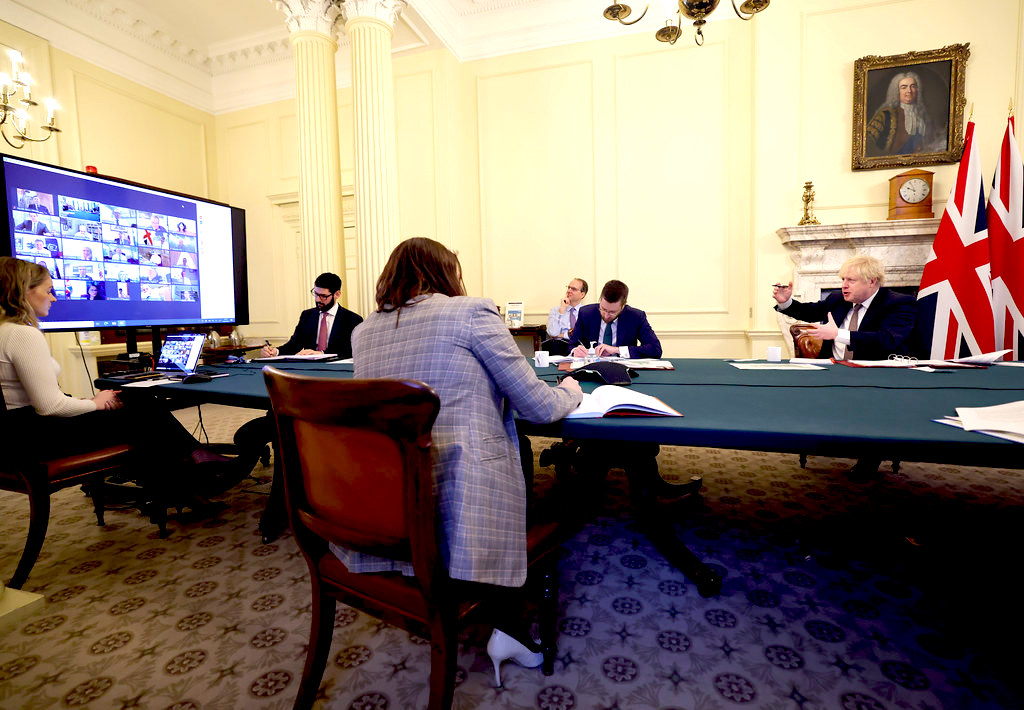
U.K. Prime Minster Boris Johnson, at right, holding a cabinet meeting in January. (No. 10 Downing Street, Pippa Fowles)
The system Riddell oversees is supposed to ensure that one member — and one member only — of the selection panels that decide who will head the bodies influencing our cultural, intellectual and environmental spaces is “independent.”
The charade of this should be obvious. Riddell’s job is to make sure that, even though the rest of the panel deciding, for example, who gets to run the BBC can be packed with Boris Johnson’s cronies, one member of the panel must be “a non-political senior independent panel member.” They even have an acronym for this sticking plaster: a SIPM.
What does “independent” mean in this case? Only that these solitary figures on the appointments panels should not be “politically active” in public — perhaps to encourage us to imagine that, in secret, there are lots of socialist bankers and hedge fund managers who pick the people who head our most important public bodies. And that, unlike the other panelists, the “independent” one should have some minimal technical understanding of the principles of making public appointments.
In other words, Riddell’s role is to make sure there is one person like him on these selection panels — a moderate apostle for neoliberalism — rather than only dog-at-dog cheerleaders for neoliberalism. And the reason is as cynical as it looks: that it benefits the system that not too many overtly dog-eat-dog candidates get appointed to Britain’s most important, visible and cherished public bodies.
Feeble Rules
Riddell earnt his place as commissioner for public appointments after a lifetime of working to salvage the image of establishment structures — persuading us that inherently corrupt institutions are basically respectable and well-meaning.
The Guardian fulfills the same role. In its report on the public appointments system, it highlights a supposed battle to maintain the system’s already non-existent integrity — as though Riddell serves as a check on government power over regulatory bodies in the same way The Guardian claims to act as a check on the rest of the billionaire-owned corporate media.
In reality, both are trying to stop real scrutiny of out-of-control power structures that are ultimately destroying economic health and environmental health on a global scale.
The Guardian report summarizes Riddell’s actions in its introductory paragraph:
“A watchdog had to prevent ministers breaching a strict code on political neutrality and independence during the search for new chairs for the BBC and the British Film Institute (BFI), the Guardian can reveal.”
What does this “prevention” amount to in practice? In the main cases cited, Riddell insisted on one member of the appointments board not being someone who trumpets their allegiance to Boris Johnson’s brand of politics.
Riddell compares the Johnson government’s rule-breaking with the situation under Johnson’s predecessor: the much blander, rightwing Conservative leader, Theresa May. He says of her: “May was, as you would expect, rather correct [enforced the “senior independent panel member” rule] and she was concerned with getting good people to do things. She was quite robust on that.”
This is what we are supposed to be excited about? This is what we are supposed to champion as proper regulation? And given how low expectations are — from Riddell, from The Guardian and from us the public — the Johnson government’s efforts to break this feeble rule are presented as some kind of special threat to good governance.
Human Warehousing
Riddell and his principles of good governance actually make no substantial difference to the appointments process he is supposed to oversee — as is apparent from the results.
Even though Riddell insisted on an “independent” member on the panel that picked the chair of the BBC, the winner was Richard Sharp, a major donor to the Tory party and former adviser to Johnson’s chancellor, the billionaire former banker Rishi Sunak. Sharp’s business ventures include funding a firm accused of “human warehousing” — stuffing benefit recipients into “rabbit hutch” flats to profit from a Conservative government scheme.
The man appointed — under Riddell’s ultimate oversight —to head the Office for Students, which regulates higher education in England, is James Wharton. He is a senior figure drawn from the inherently corrupt world of corporate lobbying whose only qualifications for the job are that he is a Conservative peer and served as Johnson’s campaign manager.
The problem here is not the one Riddell or The Guardian are peddling. Johnson’s government is indeed a threat but not in the way they are highlighting. There is no system of transparent, honest governance and regulation Johnson is undermining and that Riddell and The Guardian are seeking to protect.
Through his clownish incompetence, Johnson is threatening to expose the system’s corruption by making it even more corrupt — so corrupt, in fact, that its corruption can no longer be concealed from the public. Johnson is threatening to make a system designed to covertly maintain elite privilege explicitly do so. He threatens to discredit it, to bring it into disrepute.
To make us, like the fish, aware of the water all around us.
The Guardian and Riddell are waging a battle — one presented as critically important — to ensure that the sticking plaster continues to stick.
We are being sidelined into trivial debates about upholding rules over panels having one, solitary “independent” member. That “independent” panelist, let us note, has no influence over the shortlist of candidates. He or she has no meaningful influence over who gets picked. And more importantly still, the “independent” panelist is not even independent — they are selected, as were Ridell and the editor of The Guardian, precisely because they have spent a lifetime identifying with establishment priorities.
Riddell personifies the only permitted struggles going in our political, cultural and economic spaces.
On one side are those who have grown so confident in the elite’s ability to rig the system to its advantage that they are contemptuous of those outside their own class and no longer care how bad the system looks.
And on the other side are those who fear that, if the system’s corruption becomes too gross, too offensive, the masses may turn on the elites and end their privileges just as revolutionaries sent the French elite to the guillotine nearly 250 years ago.
Appointments to public bodies are critically important. The leaders of them shape our cultural, intellectual and social lives. But let us not pretend that anything Riddell or The Guardian are doing will bring pluralism to our public bodies or protect democracy. They will simply maintain the veil a little longer over the charade that is elite privilege masquerading as the public good.
Jonathan Cook is a former Guardian journalist (1994-2001) and winner of the Martha Gellhorn Special Prize for Journalism. He is a freelance journalist based in Nazareth. If you appreciate his articles, please consider offering your financial support.
This article is from his blog Jonathan Cook.net.
The views expressed are solely those of the author and may or may not reflect those of Consortium News.

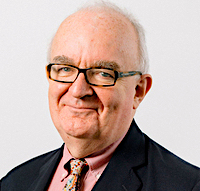
I think it’s great that Cook watches the watch dogs, but I think he should mind his language a bit. He calls the powers that be the ‘elite’. Now, the elite is litteraly the best of the best. Say an elite swimmer; there’s no point for the avarege Joe or Jolline to try to compete with her — she’s just so much faster.
By using this terme for the people in power Cook is singing with their favourite song, sungto them selves and to any one that care to listen: you know, the one about them being some kind of special, higher form of human beings.
If you have met them you know that they are rarely good at anything but being rich and powerful. And mostly just because it’s not very hard, quite the contrary: if you are born into money and power it’s infact much harder to be good at not being rich and not being powerful.
Jonathan manages to shine a light on how the elite control our most important structures, social, cultural, economic and political in their own interests. He, also, demonstrates how they manage to camouflage and protect their interests by presenting them as beneficial to society as a whole. Each layer of corruption is hidden under a veil of apparent normality and blatant, overt corruption is exposed, to present an image of institutions that are operating in our interests.
Well done Jonathan, as always, you manage to give us an insight into practices that, by their nature, are beneficial to the few and in the process undermine all our democratic institutions.
Wonderfully clear. Thank you, Jonathan!
This brings to mind a line from: ‘Look Back In Anger’: ‘Daddy’s unhappy because everything’s changed. You’re unhappy because nothing’s changed.’
Excellent piece. If only . . . ” the masses would turn on the elites and end their privileges . . . ” If only we possessed that awareness, will and common sense on a much larger scale globally. If only . . .
Sad how successful the illusion continues to keep people believing this system is legitimate in any way. It’s a global criminal racket that will destroy life on Earth if humanity doesn’t snap out of it.
As John Ressler above stated:
If only … we, as a species, had not been born as Homo-Saps; who plant feathers, expecting trees to grow, we’d by now surely have
become better critical thinkers; to snap ourselves out of our illusions.
Speaking ‘souly’ for myself , of course.